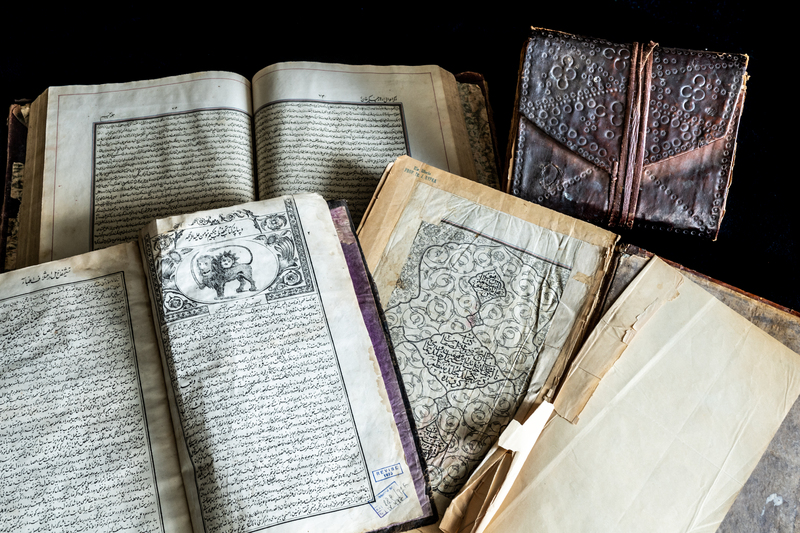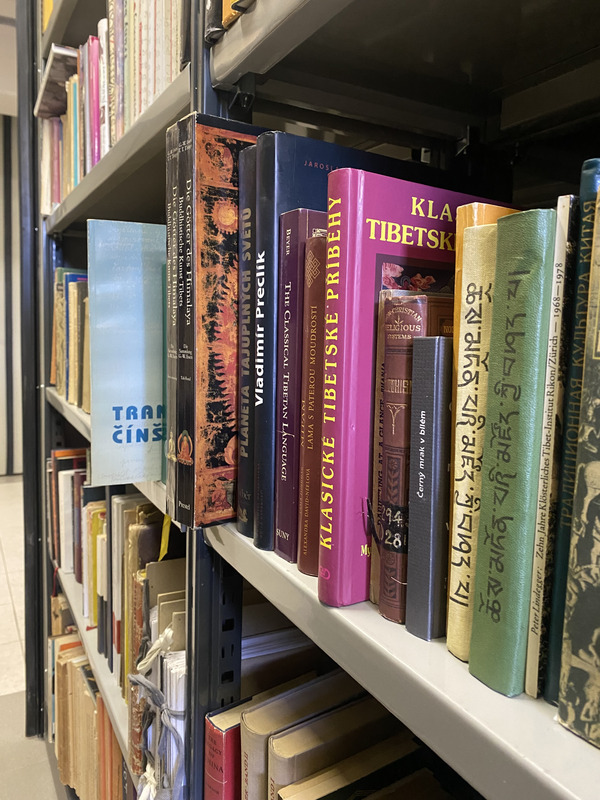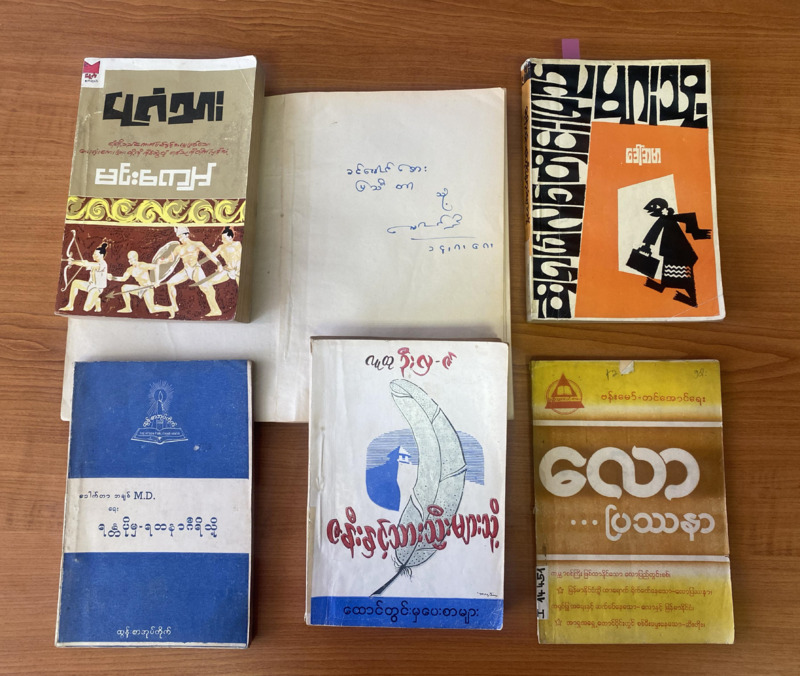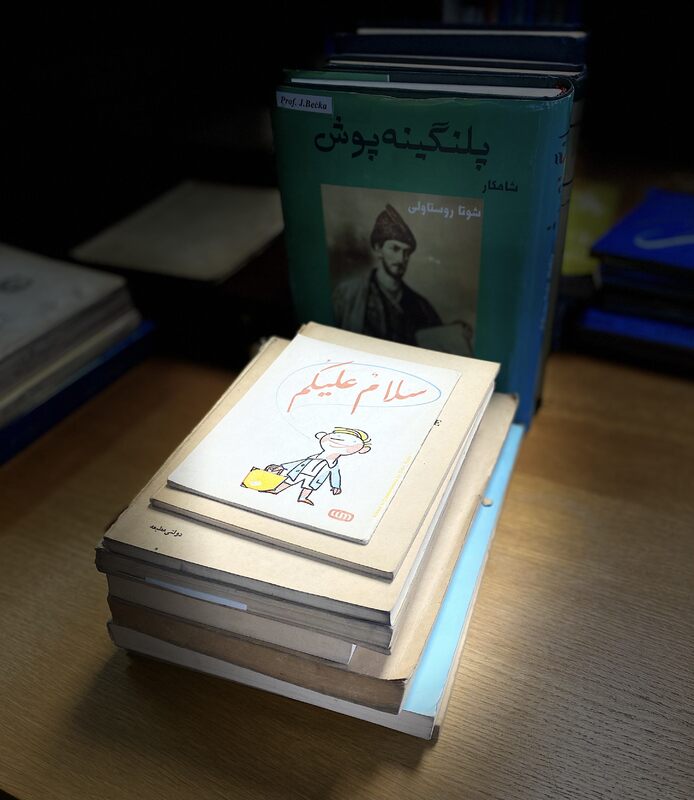This part of the exhibit provides an array of historical records and rare literary treasures unearthing the hidden stories that these pieces hold, all preserved within the hallowed halls of the Oriental Institute Library. While the institute's extensive collection of rare materials encompasses an array, this virtual exhibit showcases a curated selection of items for which scholars have already provided descriptions

Jan Rypka’s Legacy
One of the important legacies of scholars is Jan Rypka’s collection of rare manuscripts.Jan Rypka played a pivotal role in the establishment of the Oriental Institute, where he was among the first 34 members appointed by President Masaryk in November 1927. His contributions to the institute extended beyond his scholarly work, encompassing his organizational efforts during its formative years. Notably, he was instrumental in the founding of Archiv Orientalni, the institute's publication.
Rypka's personal collection within the institute includes several significant and renowned works. Among them is a Persian historian's writings, authored by Muhammad ibn Khvandshah ibn Mahmud, more commonly known as Mirkhvand. Another noteworthy piece is a medical treatise by Mir Muhammad Mu'min Husaini Tonekaboni, also known as Hakim Mu'min, who served as a physician and pharmacist in the court of the Safavid Shah Sulayman. This treatise contains a handwritten dedication and numerous handwritten notes in Farsi in the margins.Additionally, Rypka's collection encompasses a 19th-century Persian dictionary created by a poet and literary historian. This dictionary includes inserted pieces of paper that likely bear Rypka's handwritten annotations. Lastly, the collection contains poetry by Qaani, one of the most renowned poets from the Qajar era. It's important to note that aside from these mentioned items, Rypka's collection consists of various other significant and valuable materials that enrich the cultural and academic resources of the Oriental Institute.

Josef Kolmaš Personal Collection
Kolmaš’s library, reflects his deep scholarly interests to the study of Sino-Tibetan relations. The books he collected encompass rare texts, critical editions, and valuable manuscripts directly related to his research areas. These include detailed studies of Chinese and Tibetan history, analyses of cultural exchanges, and comprehensive works on religious practices and philosophies. This collection is a testament to the life’s work of Josef Kolmaš, a preeminent Czech Sinologist and Tibetologist. As a leading authority on Sino-Tibetan relations, Kolmaš dedicated his career to unraveling the complexities of this fascinating region. His extensive research, conducted primarily at the Oriental Institute of the Czechoslovak and later the Czech Academy of Sciences, culminated in a wealth of knowledge generously shared through his publications and now, through this exceptional library. As director of the Oriental Institute from 1994 to 2002, Kolmaš shaped the institution into a center of excellence for Asian studies. His personal library, a cornerstone of this collection, reflects his deep scholarly interests and offers invaluable resources for researchers, students, and enthusiasts alike. Each book in this collection not only provides a unique insight into the topics Kolmaš explored but also serves as a foundation for future research in these fields.

Jan Bečka and Dagmar Bečková Collection
Jan Bečka and Dagmar Bečková, Czech scholars dedicated to Burmese studies, made a significant contribution to the field by donating their collection of Burmese books. Their library, comprising thousands of volumes, includes numerous first editions and rare books, as well as personal gifts from prominent Burmese authors. These personal gifts often feature inscriptions and dedications, adding a unique and personal dimension to the collection. Jan Bečka was a distinguished Orientalist with a deep-seated interest in Southeast Asian, particularly Burmese, literature and culture. His scholarly work focused on translating and interpreting Burmese texts. His meticulous documentation and preservation efforts have earned him high regard in academic circles, significantly contributing to the understanding of Burmese literary traditions. While Dagmar Bečková, a fellow scholar and collaborator with Jan Becka, also made substantial contributions to the study of Burmese culture and literature. Her publications complemented Bečka's work. The generosity of Jan Bečka and Dagmar Bečková in donating their collection underscores their commitment to fostering a deeper understanding and appreciation of Burmese culture and literature.

Jiří Bečka Legacy
The legacy collection donated by the Orientalist Jiří Bečka, stands as a testament to his lifelong dedication to Persian and Central Asian studies. A distinguished researcher at the Oriental Institute of the Czechoslovak Academy of Sciences, Prof. Bečka’s scholarly pursuits spanned the history, culture, language, and literature of the region. His personal library, consist of primary and secondary sources, reflecting his profound knowledge and passion inPersian, Tajik, and Afghan philology is evident in the collection’s depth and breadth.
Bečka’s donation to the Oriental Institute Library comprises an array of texts that mirror his extensive scholarly works. The collection critical editions, and comprehensive studies on Persian, Tajik, and Afghan languages and literatures. These texts provide invaluable insights into the linguistic structures, literary traditions, and cultural narratives that Bečka explored throughout his career. The books in Bečka’s collection not only serve as vital resources for current and future researchers but also highlight the key themes and areas of inquiry that defined his academic life. They encompass historical accounts, linguistic analyses, and literary critiques, each contributing to a nuanced understanding of the region’s cultural and intellectual landscape. Bečka’s focus on the interconnections between language and culture is particularly evident in the diversity of texts, ranging from classical Persian poetry to modern Tajik prose, and from historical treatises to contemporary linguistic studies.
